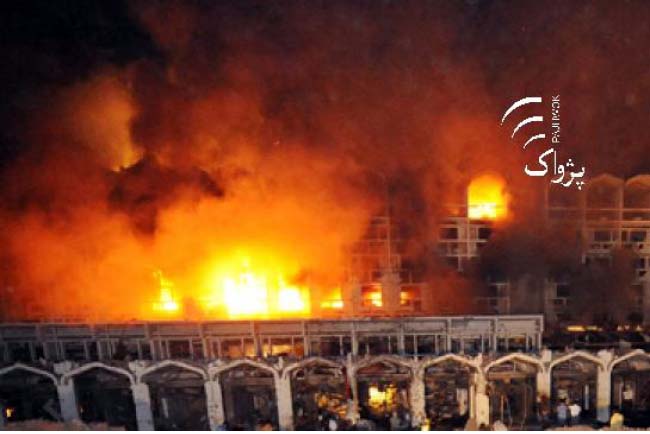Not a week goes by in which, a report about an atrocity or attack in Afghanistan or Pakistan is flashed on the news. We are then routinely bombarded from all sides as to whether it was justified or was an atrocity. However, the terrorist networks continue their insurgency without hesitation and the national and international condemnations fall on deaf ears.
The Sunday’s deadly attack at a crowded park in Pakistan, which left 74 dead and 340 people wounded, fills one with an outpouring of grief. The stream of blood oozing from the lifeless bodies of women and children, who were targeted for their racial or religious backgrounds, is an immense wrench. This lethal episode will numb your mind and senses and it is a slap on the face of humanity. Although, this outrageous act of terror has drawn strong condemnations, the anguish of victims’ families is yet to be assuaged.
Reportedly, a massive suicide bomb went off in Lahore’s Gulshan-i-Iqbal Park, a few meters from children’s play area, on Sunday evening and took heavy toll of innocent civilians – most of the victims were women and children. An offshoot of the Pakistan Taliban, Jamaat-ul-Ahrar, the banned Tehreek-i-Taliban Pakistan (TTP), later claimed responsibility for the attack in the eastern city of Lahore and said that it was aimed at killing members of an ethnic minority group who gathered in the park. Jamaat-ul-Ahrar further vowed to continue such attacks and also took responsibility for the twin bombings of a church in Lahore last year.
Members of the United Nations Security Council condemned this attack in the strongest terms. In a statement, they offered condolences to families of the victims and to the people and government of Pakistan. They hoped that hundreds of the wounded would recover quickly.
The council’s members reaffirmed that terrorism in all its forms and manifestations constituted one of the most serious threats to international peace and security. They reiterated that those responsible for the killings should be held accountable and urged all states, in accordance with their obligations under international law and relevant Security Council resolutions, to cooperate actively with the Pakistani authorities in this regard.
The members of the council stressed that all acts of terrorism were criminal and unjustifiable, regardless of their motivation and no matter where they were committed and by whom. They said this or any other attack by the TTP would only strengthen their resolve to support the people of Pakistan. The statement said, “The Security Council will continue to support the efforts of the Pakistani authorities in their fight against terrorism and violent extremism.”
Taliban insurgents, mainly the TTP group, have carried out a series of deadly attacks in Pakistan. For instance, the attack on Bacha Khan University, which killed at least 21 people, was carried out by the TTP group. The attack on the University was claimed by TTP Geedar group’s commander Aurangzaib alias Khalifa Umar Ameer Naray, who was also involved in attacks on Peshawar’s Army Public School in December 2014 and Air Force’s Badabher camp in September last year. The TTP widened its terrorist activities on a large scale. As a result, the US found out that “ISIL-K” is formed in Afghan-Pak border by members of TTP and Afghan Taliban.
Pakistan’s director general of the Intelligence Bureau, Aftab Sultan, said earlier that TTP was responsible for major terror incidents in Pakistan adding that the group had been realigning with Lashkar-i-Jhangvi and Sipah-i-Sahaba. He also mentioned killings of SP Chaudhry Aslam in Karachi and ANP leader Bashir Bilour in Peshawar.
Despite the security challenges and mounted militancy, Pakistan insisted on resuming peace talk between Afghanistan and Taliban and promised to bring the Taliban to negotiating table – Pakistani Chief of army staff, General Raheel Sharif, discussed the issue with his American interlocutor in a trip to the U.S.
Subsequently, a four-nation group, comprises Pakistan, Afghanistan, China and the United States, was formed to broker peace talk with the Taliban. They held some meetings, the fourth one was held in Kabul on February 23, and called to stop violence and bloodshed and make peace. Moreover, Pakistani officials offered to host the first round of direct talks between the Afghan government and Taliban representatives.
Pakistan’s Adviser on Foreign Affairs Sartaj Aziz said that his country will put pressure on the Taliban to hold talk. A Pakistani newspaper has reported recently that Pakistani authorities had “detained” the chief of a breakaway faction of the Afghan Taliban, Mullah Muhammad Rasool. He was chosen in early November by several Taliban cadres opposed to Mullah Akhtar Mansoor’s ascendency to head the splinter group.
It is believed that Rasool’s capture will be used as “lever” to mount pressure on the Taliban to give in for talks.
However, the Taliban have still refused to hold talks and persist on their preconditions and continue their acts of terror in Pakistan and Afghanistan. They inflict heavy casualties on innocent civilians perhaps to react against the two governments’ actions.
Considering this issue, peace talk is less likely to come to fruition, and Afghanistan and Pakistan will have to intensify their military operations against any terrorist networks – that refuse to stop violence. Moreover, the violators of human rights should be brought to justice.
Home » Opinion » Deadly Attack in Pakistan
Deadly Attack in Pakistan
| Hujjatullah Zia

